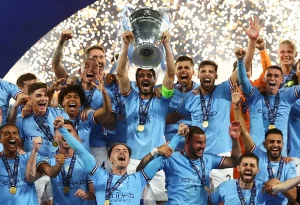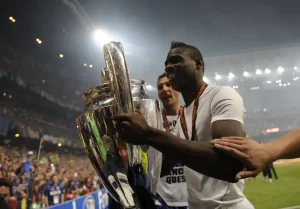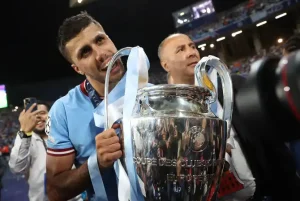The Rise of a European Powerhouse

A New Era Under Pep Guardiola
The Man City Champions League adventure truly began when Pep Guardiola came at the Etihad Stadium. He came with a plan and an exceptional mindset. From the start, Pep altered the way City played. He introduced high-intensity pressing and fast passing. His strategy was clear—control every game. The players adjusted swiftly. Under his leadership, Manchester City became feared. With major names like Kevin De Bruyne, Raheem Sterling, and Sergio Aguero, the team became dominant. Domestic success followed, but the champions league final was the ultimate prize. Premier league champions campaign in those early years showed potential, yet success was limited. Even still, fans believed the dream was possible. The team trained harder. The focus turned to Europe.
Building a Team Fit for Europe
To compete in the Man City Champions League trip, the club recognized it had to construct a squad with depth. Quality was key. The owners backed Guardiola with wise investments. Over time, they signed crucial players for every position. Ruben Dias, Rodri, and João Cancelo reinforced the backline and midfield. Meanwhile, Foden and Grealish brought flare up front. The team wasn’t simply created to win the Premier League; it was built for Europe. Guardiola ensured every player understood their position. Substitutes played as hard as starters. City’s run in Europe required this approach. Behind the scenes, coaches focused on every aspect. From nutrition to fitness, everything mattered. The champions league table regularly placed them at the top during group stages.
Key Matches That Defined Man City’s UEFA Campaigns
Early Struggles and Near Misses
The early Man City Champions League campaigns were tough. Although the team had skill, the results didn’t follow. Fans expected tremendous things, but disappointment came instead. In 2016, Monaco startled them. A few years later, Liverpool ended their aspirations early. These moments harm the club and supporters. But City learns from every defeat. Man City’s UEFA campaign slowly evolved. Players recognized what Europe required—more guts and discipline. Each season, they pushed forward. Guardiola changed tactics and increased morale. Slowly, they acquired confidence. The champions league table often demonstrated domination in group stages. But the real test came in knockouts. Opponents were tougher. Mistakes proved costly. Still, City never backed down.
Breakthrough Seasons and Big Wins
Everything transformed when City finally won the big games that formerly haunted them. The Man City Champions League breakthrough came in 2020 when they overcame Real Madrid. That triumph gave them belief. Soon after, they beat PSG in another historic tie. Suddenly, reaching the champions league final felt real. In 2021, they did it. For the first time, City stood on the largest platform. That season, Man City’s UEFA campaign was almost perfect. Their defense stayed firm. The midfield dominated, while the attack produced goals. Every match showed maturity. They no longer looked like newcomers—they played like seasoned European heavyweights. The champions league table confirmed their domination. Fans felt proud. City’s European challenge had peaked.
Tactical Evolution in City’s European Challenge
Shifts in Playing Style and Formations
The tactical progress throughout the Man City Champions League adventure has been outstanding. Under Pep Guardiola, City’s strategy kept evolving. They opened with high pressing and short passing. Over time, Pep proposed fresh concepts. He utilized inverted full-backs and a false nine. These modifications baffled opponents. Man City’s UEFA campaign mirrored this ingenuity. The team always adjusted based on opponents. Against stronger sides, they defended deeper and struck on the counter. In easy games, they controlled every minute. City’s European challenge demanded such balance. One false move could cause defeat. So, Guardiola focused on technicalities. Training encompassed every potential circumstance. Their standing in the champions league table typically reflected such preparedness. They topped groups, remained unbeaten, and scored freely.
Key Players and Their Tactical Roles
Behind every great Man City Champions League run stood crucial players who followed Guardiola’s system brilliantly. Kevin De Bruyne often commanded the midfield. His passes opened defenders. Riyad Mahrez contributed goals from wide areas. Phil Foden’s energy propelled the team onward. Ruben Dias supplied calm and leadership at the back. Ederson’s talent with his feet helped build from the back. These stars were the basis of Man City’s UEFA campaign. Their synergy showed in every game. Guardiola trusted them. Every player understood their role. During City’s European challenge, subs had effects too. Gundogan and Bernardo Silva either sank deep or raced ahead, depending on the game. As premier league champions, they had pressure but also confidence.
The Road to Glory:
The Final Match and Ultimate Triumph
 When City eventually reached the big stage again, the Man City Champions League fantasy became reality. In 2023, they met Inter Milan in the champions league final. The game was tense. City retained control, but Inter pressed hard. Rodri’s goal in the second half made the difference. The whole stadium erupted. Man City’s UEFA campaign had finally paid off. The players hugged. Fans cried with joy. Guardiola seemed emotional. The European challenge had come to an end—with glory. City became European champions. Their name got into history books. The champions league table no longer only showed promise—it denoted success. City demonstrated they belonged among Europe’s best. From being premier league champions to now winning the biggest European prize, their journey was complete.
When City eventually reached the big stage again, the Man City Champions League fantasy became reality. In 2023, they met Inter Milan in the champions league final. The game was tense. City retained control, but Inter pressed hard. Rodri’s goal in the second half made the difference. The whole stadium erupted. Man City’s UEFA campaign had finally paid off. The players hugged. Fans cried with joy. Guardiola seemed emotional. The European challenge had come to an end—with glory. City became European champions. Their name got into history books. The champions league table no longer only showed promise—it denoted success. City demonstrated they belonged among Europe’s best. From being premier league champions to now winning the biggest European prize, their journey was complete.
Celebrations and Legacy of the Victory
Winning the Man City Champions League trophy altered everything. The city of Manchester rejoiced for days. Players took the trophy on an open-top bus tour. Fans crowded the streets with flags, singing, and fireworks. Pep Guardiola talked with pride. He called it one of his best achievements. Man City’s UEFA campaign had inspired a generation. The young athletes who watched now dream of wearing blue. For City’s European challenge, this victory offered closure. It proved that even beginners may rise. The champions league table suddenly included Manchester City’s name at the very top. Every goal, every save, every moment lead to this day. Being premier league champs was great. But winning in Europe finished the story. Sky Sports, UEFA, and fans around the world awarded them credit. That one win sealed a legacy.
Future Goals and Challenges for Manchester City
Sustaining Success in Europe
After winning the Man City Champions League, the problem became staying at the top. It’s hard to win it once. But it’s even tougher to do it again. Guardiola knows this. That’s why he focused on keeping the squad strong. Transfers stayed smart. Training got even better. Players remained motivated. The Man City’s UEFA campaign in coming seasons sought for consistency. They didn’t want one lucky season. City’s European objective now included defending their title. Other elite teams studied their strategies. Matches became tougher. Still, City fought. They understood the champions league final would be harder to reach. But they had belief. Their presence in the champions league rankings kept them among the best. Being premier league champions helps preserve the winning habit.
Youth Development and Building the Next Era
To stay dominating in the Man City Champions League scene, the team started focusing more on youth. The academy got superior coaches. Young players trained alongside the first team. Foden’s rise encouraged others. Guardiola offered chances to emerging talent. Man City’s UEFA campaign needs future stars. They intended to develop not just for today but for the coming decade. Scouts searched for skill and attitude. The team signed top prospects early. City’s European challenge would now have fresh faces. These kids learned from legends. That balance of youth and experience gave City power. As premier league champions, they set the standard for progress. The champions league table didn’t only reflect one generation. It suggested at a dynasty.
Conclusion:
The Man City Champions League journey depicts a story of belief, growth, and success. What started as a dream evolved into history. They experienced discomfort yet continued going. Each season taught them something new. From Pep’s tactics to young development, every part mattered. Their UEFA campaign wasn’t simply about football—it was about determination. City’s European challenge brought fans closer. It united the club. Now, they are not merely premier league champions. They are kings of Europe. The champions league final win was the crown jewel. It signaled the conclusion of one chapter and the start of another. Manchester City currently ranks with Europe’s elite.
Frequently Asked Questions(FAQs)
1. What is the significance of Man City’s Champions League journey?
 Man City’s Champions League campaign highlights the club’s climb to prominence in European sport. After years of near-misses and learning from losses, City has steadily matured into a strong contender in the league. Pep Guardiola’s managerial impact, allied with the team’s tactical evolution, has made them one of the most feared sides in Europe. Their journey is emblematic of their intentions to not only dominate the Premier League but also establish themselves as a great European force. Their goal to win the Champions League became even more pressing since they’ve repeatedly exceeded in domestic events, displaying their readiness for European triumph.
Man City’s Champions League campaign highlights the club’s climb to prominence in European sport. After years of near-misses and learning from losses, City has steadily matured into a strong contender in the league. Pep Guardiola’s managerial impact, allied with the team’s tactical evolution, has made them one of the most feared sides in Europe. Their journey is emblematic of their intentions to not only dominate the Premier League but also establish themselves as a great European force. Their goal to win the Champions League became even more pressing since they’ve repeatedly exceeded in domestic events, displaying their readiness for European triumph.
2. How did Pep Guardiola impact Manchester City’s European ambitions?
Pep Guardiola’s appointment as manager was a turning point for Manchester City’s Champions League hopes. His tactical prowess altered the club’s approach to European contests. Guardiola concentrated on controlling possession, pressing high, and playing an attacking brand of football. His tactical adjustments, such as deploying inverted full-backs and a false nine, allowed City to outsmart European clubs tactically. Under his supervision, the team established a roster capable of competing with the best in Europe. With Guardiola’s influence, City’s UEFA campaign got more focused, and their general gameplay evolved, pushing them closer to the elusive Champions League trophy.
3. What were the early hurdles for Man City in the Champions League?
In the beginning, Man City faced a variety of hurdles in their Champions League campaigns. Despite possessing a great group, the team unable to move past the knockout stages. They experienced early exits against teams like Monaco and Liverpool, when their European aspirations were shattered. These losses proved that while City had the home power, they still needed the European experience and guts to prevail at the highest level. However, these defeats were vital learning experiences. They helped City comprehend the intensity and demands of Champions League play, creating the groundwork for future achievements.
4. When did Man City eventually achieve a breakthrough in the Champions League?
Man City’s breakthrough in the Champions League occurred during the 2020-2021 season. They overcame Real Madrid, a behemoth of European football, in a historic round of 16 tie. That triumph gave the team the belief that they could go all the way. They followed up with another huge victory over PSG in the semi-finals, reaching their first-ever Champions League final. While they eventually lost to Chelsea in the final, this season showed the world that City had arrived as serious contenders. The 2021 campaign highlighted the culmination of years of hard effort and progress across Europe.
5. How did Man City’s squad evolve to meet the demands of European football?
To compete in the Champions League, Man City realized they needed to assemble a squad capable of competing at the greatest level. Over the years, the club spent considerably in players who could bear the rigors of European football. Key arrivals like Ruben Dias, Rodri, and João Cancelo bolstered their defense and midfield, offering more stability and depth. Young talents like Phil Foden and Jack Grealish provided innovation and flare to the attack. These arrivals allowed City to rotate and maintain their vigor, ensuring they could compete both locally and in Europe. This progression was vital for their Champions League dreams.
6. What role did tactical flexibility have in Man City’s Champions League success?
Tactical versatility has been one of the fundamental keys in Man City’s Champions League success. Under Pep Guardiola, City embraced a flowing style of play. Guardiola’s tactical adjustments allowed them to adapt to different opponents. In some matches, they pressed high up the pitch, while in others, they sat deeper and counter-attacked. The usage of inverted full-backs, a false nine, and varied formations kept opposition teams guessing. This variety made City difficult to predict, which was vital in Europe’s elite competition. The champions league standings often mirrored this versatility, with City leading their group and achieving dominant victories in the knockout stages.
7. How did key players help to Man City’s Champions League campaigns?
Key players have been essential to Manchester City’s success in the Champions League. Kevin De Bruyne has been a vital player, dictating the pace in midfield and creating assists. His ability to break down defenses with his vision and passing has been vital. Players like Riyad Mahrez, who contributed with critical goals, and Ruben Dias, whose leadership and defensive skills were vital, assisted City in their European campaigns. Goalkeeper Ederson’s distribution from the back also helped the club to play out from defense and maintain control. These players, along with others, constituted the backbone of Man City’s run in Europe, contributing both in attack and defense.
8. What lessons did Man City take from their early Champions League exits?
Man City acquired numerous vital lessons from their early Champions League failures. First, they learned the value of possessing both tactical discipline and emotional resilience in high-pressure knockout games. Losing to teams like Monaco and premier league champions showed that a single error may result in elimination. City’s early exits also showed the necessity for a deeper squad to cope with the demands of European football. These experiences helped define their approach in following years, with Guardiola focusing on more balanced and mature performances. With time, they became more collected, and their future success was built on these early lessons.
9. How significant is the Champions League final for Manchester City?
The Champions League final is tremendously important for Manchester City, as it symbolizes the culmination of years of hard work and desire. For a club that has dominated domestic football, winning the Champions League is the final piece of the puzzle in terms of establishing themselves as one of the world’s top footballing powers. For players like Kevin De Bruyne and Pep Guardiola, who have made big contributions, winning the Champions League is a key career goal. City’s constant pursuit of the crown underscores their desire to be acknowledged not just as premier league champions, but as champions of Europe.
10. What is the future of Man City in the Champions League?
The future of Manchester City in the champions league table looks optimistic. With a deep roster, world-class management, and seasoned key players, City is well-positioned to continue contending at the highest level. The club’s investments in development and tactical evolution under Pep Guardiola assure that they will be a top competitor for years to come. As City continues to build on their European campaign, their recent success and consistency imply that they may soon achieve their ultimate goal—lifting the Champions League title.
